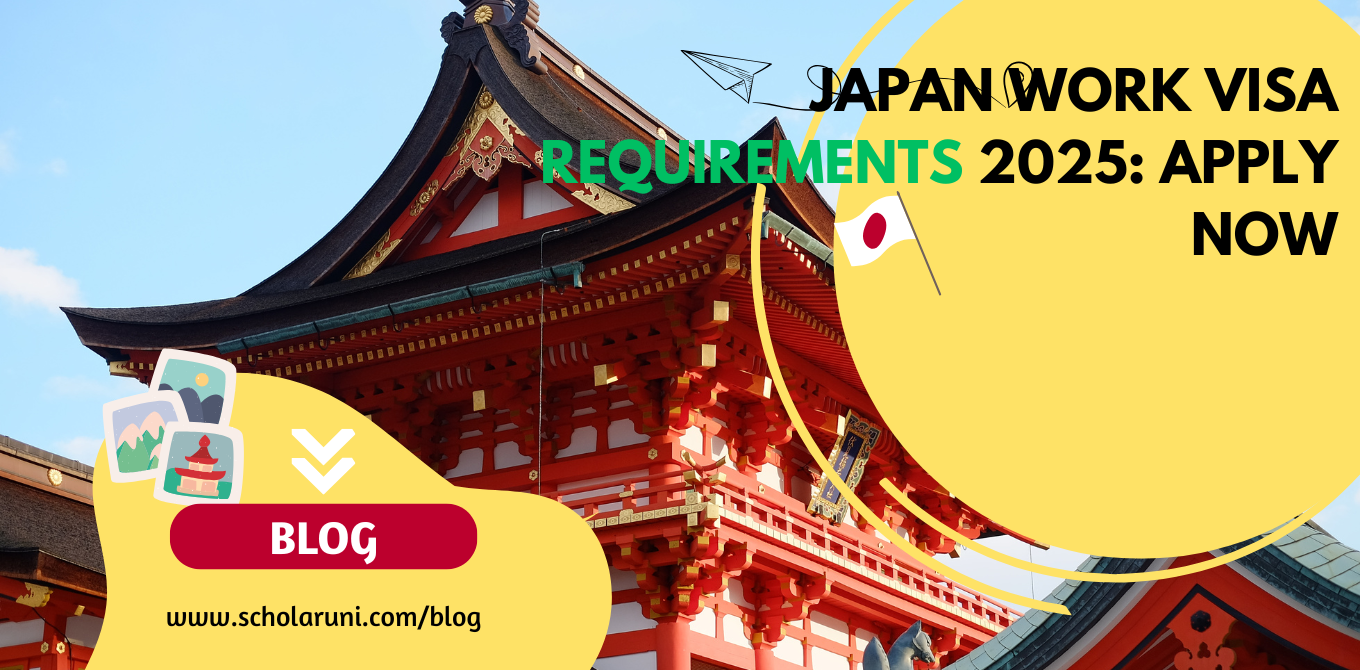
Work Visa
Japan Work Visa Requirements 2025: Apply Now
Admin | July 26, 2025, 6:37 a.m.
The Certificate of Qualification (COE) is a prerequisite for applying for a Japan visa if you are visiting the Land of the Rising Sun for reasons other than tourism. This certificate, which attests to the applicant's eligibility to enter Japan for employment, family, or another acceptable reason, is issued as the first step in the application and visa preparation process for Japan. If you have just arrived in Japan, you can sign up and get this certificate later.
The number of Japanese visas is usually constant, regardless of the kind of visa you are seeking for. Whether you want a single-section or multiple-section visa will determine the price. The sort of visa you are granted determines if your Japanese visa is legitimate. A work visa usually has a longer validity period than a visitor visa, which is usually granted for a shorter duration. The various legitimacy lengths, which are customized to the applicant's particular goals within the nation, reflect their particular needs and circumstances.
Also Check Update : Scholarships ! Internship! Job!
Work Visas in Japan:
Please visit the Japan Embassy website to learn about the two main types of work visas available in Japan, each having a number of subcategories.
Highly Talented Experts Visa: This type of visa is intended especially for people who have excelled in a particular subject or shown extraordinary talent. The validity period is extended to a maximum of five years.
Japan Working Visa: This type of visa is available for 1, 3, or 5 years and is designed for people seeking regular job. Specialized skills are not required; a legitimate job offer is enough.
The maturation of the population is responsible for the notable changes in the work visa environment in Japan. As a result, the country is aggressively looking for outside support. An estimated 500,000 remote specialists are expected to be accepted by 2025. Finding the moment at which your potential commitment is relevant is usually accurate. Additionally, it's interesting to note that Japanese people are known for their discipline, vigor, and friendliness.
Furthermore, it is often a beneficial arrangement because of Japan's exceptionally low cost of living.
Specified Abilities Visa 1-SSV1:
To be eligible for this visa, applicants must pass a Japanese dialect test and specialist tests. The type of work you will be doing will determine how well you can speak Japanese, however you must be at least an N4 level.
Skilled professionals who apply for this visa will work in the following fields:
- Agriculture
- Materials processing
- Nursing care
- Shipbuilding
- Restaurants
- Airport ground taking care of and airplane maintenance
- Food and beverage
- Hotels
- Industrial machinery
- Electronics and electric machinery
- Building cleaning
- Construction
- Vehicle maintenance
- Fishery
Also Check Update : Scholarships ! Internship! Job!
The duration of this visa is one year, with the possibility of a five-year renewal. It is forbidden for specialists to bring their family along. If a worker needs the support of their family or wants to stay in Japan for more than five years, they can apply for Visa 2-SSV2.
Specified Aptitudes Visa 2-SSV2:
In contrast to Visa 1-SSV1, this visa is eligible for inconclusive renewal, and visa holders are permitted to bring their families to Japan. Currently, specialists who are residing and working in Japan on Visa 1-SSV1 may apply for this visa upon achieving a higher level of specialization in their profession.
Eligibility for the Japan Work Visa Procedure:
- A job offer from a Japanese corporation
- Your passport
- Visa application document
- Image
- Certificate of Eligibility
- The material depicted in the beneficiary organization’s diagram
- Diploma, curriculum vitae, and other documents that attest to your professional status
- Documentation verifying the action, its duration, position, and compensation
- It will be necessary to demonstrate to engineers:
- Materials that are identified as the commerce substance of the beneficiary organization;
- Diploma or a certificate of graduation with a major in the subject matter of the activity for which the visa is being attached;
- Documents that attest to your professional expertise;
- Documents that verify the action, its terms, position, and compensation.
- When applying for a Japanese work visa, the Certificate of Qualification is vital. This certificate is issued by the Movement Administrations Office of Japan. In the event that you are unable to deliver the frame in person, you may send it to a Japanese or government office in another country.
Benefits of the Work Visa Process for Japan:
- Clear Route to Residency: The work visa procedure in Japan is distinguished by its simple prerequisites and uncomplicated rules, which make it easier for qualified workers who wish to become permanent residents of the nation to get long-term residency.
- Different Types of Visas for Different Professions: Japan offers specific work visas for a range of occupations, such as skilled labor, engineering, the humanities, and entertainment. Finding visas suitable for specific businesses and skill levels is made easier by this diversity.
- Permanent Residency Pathway: After a few years of employment in Japan, visa holders may be qualified for permanent residency. Highly qualified professionals may also be eligible for accelerated residency alternatives.
- Family Inclusion: A large percentage of work visas allow visa holders to bring their spouses and kids, which helps to stabilize the family unit. Spouses may also be eligible for dependent visas, which allow them to work part-time.
- Superior life Standards: Japan is known for its outstanding public services, healthcare, and education, all of which add to the country's high standard of life. People with work visas can access reliable and reasonably priced healthcare through Japan's health insurance system.
- work security and Competitive Salary: Japan offers competitive compensation across a range of industries and places a high priority on long-term employment and work security, especially for educated professionals.
- Cultural Experience and Learning: Living and working in Japan offers the chance to get immersed in a rich tradition, learn the language, and experience a distinctive culture. Furthermore, many employers offer language support and cultural integration programs.
- Worker Rights and Protections: Japan's strong labor laws protect workers' rights, including paid leave, standardized working hours, and fair compensation. Employees are expected to work in a polite and safe workplace.
- Professional Development and Growth: Technology and innovation are highly valued in Japan's economy, which is especially beneficial for career progression in fields like manufacturing, engineering, finance, and information technology. There are many of chances to improve one's abilities.
- Asia Travel Opportunities: Due to Japan's advantageous position, work visa holders can travel and experience various cultures more easily by visiting other Asian nations for both business and pleasure.
How Do I Apply for a Work Visa to Japan?
Obtain a COE, or Certificate of Qualification: Your incoming Japanese manager will help you obtain this necessary document, which is a requirement for your visa application.
You should wait to apply for a Japan work visa at the Japanese government office in your nation of residence. You can find the closest location by going to the embassy's website.
In summary:
The application process for a work visa to Japan is easier than it might seem. There is a defined procedure from obtaining a job offer to researching how to prepare a visa application. Japan has a pleasant environment and a wide range of exciting prospects. Take advantage of this chance to accomplish your career goals in this remarkable country!
Also Check Update : Scholarships ! Internship! Job!
Frequently Asked Questions:
Does Japan currently grant work visas?
The kind of work you undertake in Japan will determine the kind of employment visa or work permit you require. Depending on their occupations and the reasons behind their relocation, foreign nationals can apply for about 30 different work and long-term visas to Japan.
How long does it take to obtain a Japanese work visa?
It typically takes five to ten days to process a Japan work visa. If there are problems with your application or the volume of applications, it may occasionally even take longer than that.
In Japan, who is qualified to work?
In order to obtain a valid work visa, you must obtain a Certificate of Eligibility (CoE) from Japan's Ministry of Justice before you can enter the country for any non-touristic purpose. This certification serves as proof that a person is legally permitted to remain in Japan for work, family, or other valid reasons.
Related To the blog
Learn More about Work Visa.
Japan Work Visa Requirements 2025: Apply Now
The Certificate of Qualification (COE) is a prerequisite for applying for a Japan visa if you are visiting the Land of the Rising Sun for reasons other than tourism.

Unlock College Admission Secrets: Tips for 2024 Applicants
The introduction It might be like going into unknown waters when navigating the college admissions process. Given the large number of applicants fighting for admission to prestigious universities, it's critical to comprehend the fundamental
Last updated 446 days ago
Touch with us
Get Exclusive Latest Updates That We Only Share With Email Subscribers.
scholaruni